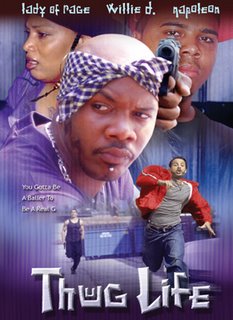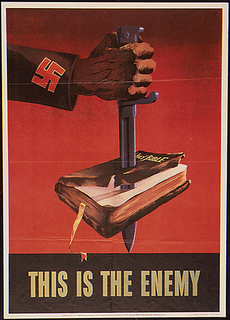
Power of the Pen
The president uses signing statements to decree which laws apply to him.
by James Bovard
For generations, Republican politicians have spoken reverently of the rule of law. But since 2001, this hoary doctrine has been redefined to mean little more than the enforcement of the secret thoughts of the commander in chief.
George W. Bush has added more than 750 “signing statements” to new laws since he took office. Earlier presidents occasionally appended such comments to new statutes, but Bush is the first to use signing statements routinely to nullify key provisions of new laws. He perennially announces that he will not be bound by limits on his power and that he will scorn obligations to disclose how federal power is being used.
While Bush supporters speak glowingly of originalist interpretations of the Constitution, Bush’s signing statements have far more in common with George III than with George Washington. The Constitution specifies that Congress shall “make all laws” and that presidents must “take care that the laws be faithfully executed.” But Bush—his ego swollen by swarms of groveling intellectuals—has embraced theories that convince him that the president alone may decree what shall be the law.
Bush’s most famous signing statement was on the Detainee Treatment Act of 2005. After White House Counsel Alberto Gonzales publicly declared that Bush enjoyed a “commander in chief override” regarding laws prohibiting torture, members of Congress enacted legislation to make it stark that torture was illegal. The White House engaged in long and arduous negotiations with Congress. After Bush signed this law last Dec. 30, he announced that he would construe it “in a manner consistent with the constitutional authority of the President to supervise the unitary executive branch and as Commander in Chief and consistent with the constitutional limitations on the judicial power.”
This was widely interpreted to mean that the law is binding only when Bush pleases. He was reiterating a confidential 2002 Justice Department memo that declared that the federal Anti-Torture Act “would be unconstitutional if it impermissibly encroached on the President’s constitutional power to conduct a military campaign.”
Getting the Patriot Act renewed was one of the Bush administration’s highest priorities. After months of negotiations and compromises, a bipartisan agreement was finally reached, giving the White House almost everything it wanted. As part of the deal, Bush administration officials agreed to provide Congress with more details on how Patriot Act powers were being used. The Justice Department would be obliged to disclose to Congress how many Americans’ privacy was being violated by FBI subpoenas known as National Security Letters. (The Washington Post reported that the FBI was issuing 30,000 such letters a year).
However, Bush reneged in a “signing statement” quietly released after a heavily hyped White House bill-signing ceremony. Bush decreed that he was entitled to deny Congress any information that would “impair foreign relations, national security, the deliberative process of the executive, or the performance of the executive’s constitutional duties.” Bush announced that he would interpret the law “in a manner consistent with the president’s constitutional authority to supervise the unitary executive branch and to withhold information.”
In other words, any provision in the law that requires disclosure is presumptively null and void. The crux of the “unitary executive” is that all power rests in the president and that checks and balances are an archaic relic. This is the same “principle” the Bush administration invoked to deny Congress everything from Iraqi war plans to the records of the Cheney Energy Task Force. Bush has invoked the “unitary executive” doctrine almost 100 times since taking office, according to Miami University professor Christopher Kelley.
Democrats were furious over what they saw as a Bush Patriot Act double-cross. Representatives Jane Harman (D-Calif.) and John Conyers (D-Mich.) bitterly complained to Gonzales: ‘‘Many members who supported the final law did so based upon the guarantee of additional reporting and oversight. The administration cannot, after the fact, unilaterally repeal provisions of the law implementing such oversight.”
The Bush administration ignored the complaint.
Bush’s prerogative also apparently includes the right to cover up waste, fraud, and abuse—regardless of how badly taxpayers get boarhogged. After Congress created an inspector general in late 2003 to look into the Coalition Provisional Authority, Bush decreed, “The CPA IG shall refrain from initiating, carrying out, or completing an audit or investigation, or from issuing a subpoena, which requires access to sensitive operation plans, intelligence matters, counterintelligence matters, ongoing criminal investigations by other administrative units of the Department of Defense related to national security, or other matters the disclosure of which would constitute a serious threat to national security.”
Since the Bush administration seems to consider any unfavorable press coverage a “threat to national security,” it is not surprising that the inspector general found almost nothing—despite pervasive reports and rumors of massive fraud. (There is no evidence that the wording of the signing statement was dictated by Halliburton.) Bush also used a signing statement to undermine the power and independence of an inspector general for Iraq in 2004 legislation.
Another frequent target of Bush signing smitings are provisions in laws on whistleblowers. Apparently he considers legal protections for whistleblowers a violation of his own prerogatives.
The administration recently swayed the Supreme Court to undermine protections for federal employees who disclose federal crimes, and the Justice Department is signaling that it could prosecute both whistleblowers and journalists who publish leakers exposing government abuses.
Some people consider Bush’s “El Supremo” view of his own powers as necessary for the war on terror.
But Bush claims this prerogative regarding any foreign intervention. As the Boston Globe’s Charlie Savage, who has done the best work on this subject, noted, “On at least four occasions while Bush has been president, Congress has passed laws forbidding US troops from engaging in combat in Colombia, where the US military is advising the government in its struggle against narcotics-funded Marxist rebels. After signing each bill, Bush declared in his signing statement that he did not have to obey any of the Colombia restrictions because he is commander in chief.”
The Colombian government’s paramilitary allies have committed some of the worst atrocities in recent Latin American history. The fact that Bush would claim a unilateral right to engage in what could become a full-scale civil war in Colombia vivifies that his boundless power stems from his job title—not from any conflict with al-Qaeda or other “Islamofascists,” as he likes to call them.
Bush’s signing statements also imply that he considers the Posse Comitatus Act of 1878—which prohibited using the U.S. military for domestic law enforcement—null and void. Congress passed laws in 2004 and 2005 prohibiting the military from using intelligence not “lawfully collected” on American citizens. In both cases, as Savage noted, “Bush declared in signing statements that only he, as commander in chief, could decide whether such intelligence can be used by the military.” It is appalling that Congress would feel it necessary to pass a law declaring that the Pentagon cannot violate the Bill of Rights—but the president responds by declaring that he will not be bound by any such law—or by the Constitution.
The “signing statement” gambit for stretching presidential power was hatched during the Reagan administration. Attorney General Ed Meese instructed Samuel Alito, then a Justice Department lawyer, to analyze how such presidential assertions could buttress the administration’s viewpoints in court. But Alito was a piker compared to George W. Bush. Alito declared that the Justice Department should ‘‘concentrate on points of true ambiguity, rather than issuing interpretations that may seem to conflict with those of Congress.”
Bush, on the other hand, has used signing statements to negate the most important parts of legislation. According to the Bush administration, if the president issues a signing statement memo that is printed in the Federal Register, federal agencies are not obliged to obey laws enacted by Congress.
The American Bar Association has appointed a bipartisan panel to examine whether Bush’s signing-statement policies conflict with the Constitution. Their report is due later this summer. However, an ABA report earlier this year that concluded that Bush’s warrantless wiretaps were illegal failed to make the slightest dent in either the administration’s policies or its preening.
We have a nullification crisis at the heart of the American Republic. Torture is apparently legal, despite a federal prohibition. Domestic wiretapping is apparently legal, despite clear legal and constitutional prohibitions. Seizing suspects and holding them indefinitely is apparently legal, despite the Constitution’s requirement of habeas corpus.
Apparently, the government is not obliged to obey any law that Bush does not personally approve of. And how can we know which laws Bush approves of? It’s a secret. Bush’s personal thoughts thus become the ultimate law of the land—and no one can know if the government is violating the “law” because Bush has not publicly declared what the law is.
Why should anyone give Bush the benefit of the doubt and assume that he is obeying all of the laws that he has not yet publicly proclaimed a right to violate? New York University law professor David Golove told the Boston Globe, “Where you have a president who is willing to declare vast quantities of the legislation that is passed during his term unconstitutional, it implies that he also thinks a very significant amount of the other laws that were already on the books before he became president are also unconstitutional.”
Americans may have to wait many years to learn what the rule of law meant in 2006. The truth may be suppressed until Bush’s aides begin publishing their memoirs or until the Supreme Court has a change of mood and decides that the executive branch is not entitled to boundless secrecy.
In the meantime, don’t count on the legislative branch to right the balance: Bush has encountered almost no effective resistance in his own party to his power grabs. One Republican senator recently told author Elizabeth Drew: “We’ve got to hang with the president because if you start splitting with him or say the president has been abusing power we’ll all go down.” Sen. Pat Roberts (R-Kan.), the chairman of the Senate Intelligence Committee, recently denounced criticism of the NSA warrantless wiretapping as “insulting” to the president, Drew reported.
Apparently, some prominent Republicans believe that the president cannot be criticized even after he admits breaking the law.
So what is the meaning of “limited government” in the Bush era? Merely that the courts and Congress must be prohibited from limiting the president’s power.









